【2022中考英语一轮教材专题复习】外研七年级上册 Modules 6-10课件(共111张PPT)
文档属性
| 名称 | 【2022中考英语一轮教材专题复习】外研七年级上册 Modules 6-10课件(共111张PPT) |  | |
| 格式 | pptx | ||
| 文件大小 | 3.8MB | ||
| 资源类型 | 试卷 | ||
| 版本资源 | 外研版 | ||
| 科目 | 英语 | ||
| 更新时间 | 2022-02-12 20:01:09 | ||
图片预览

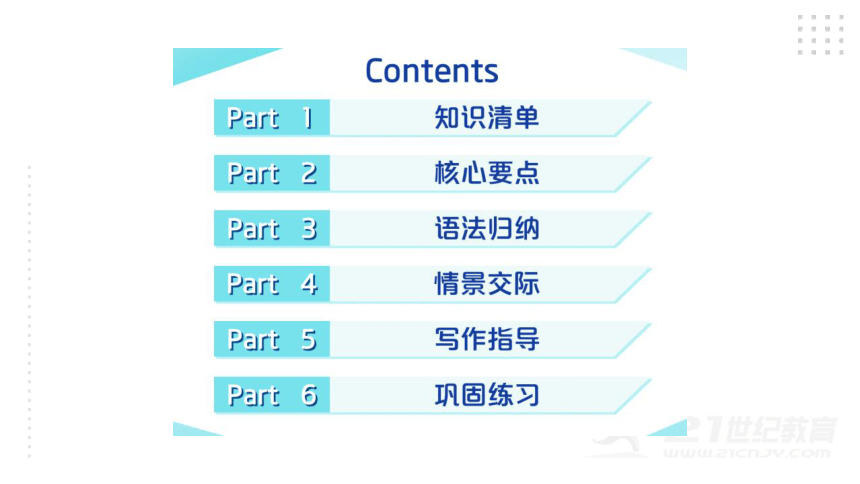
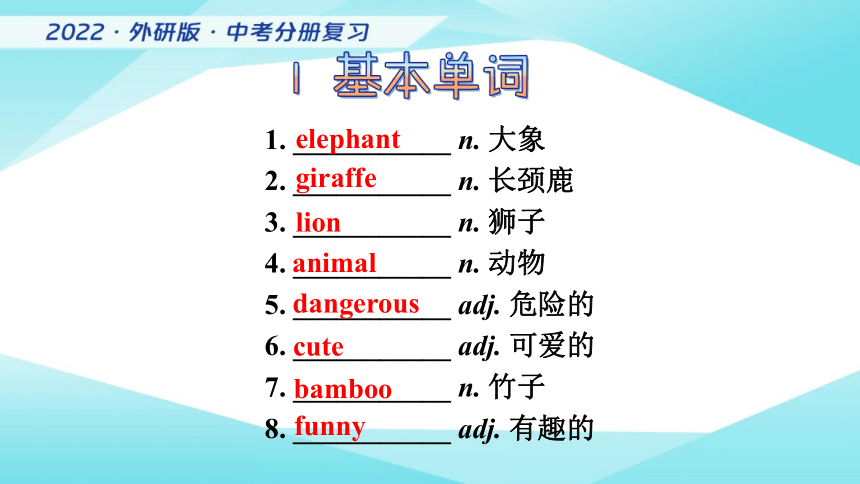
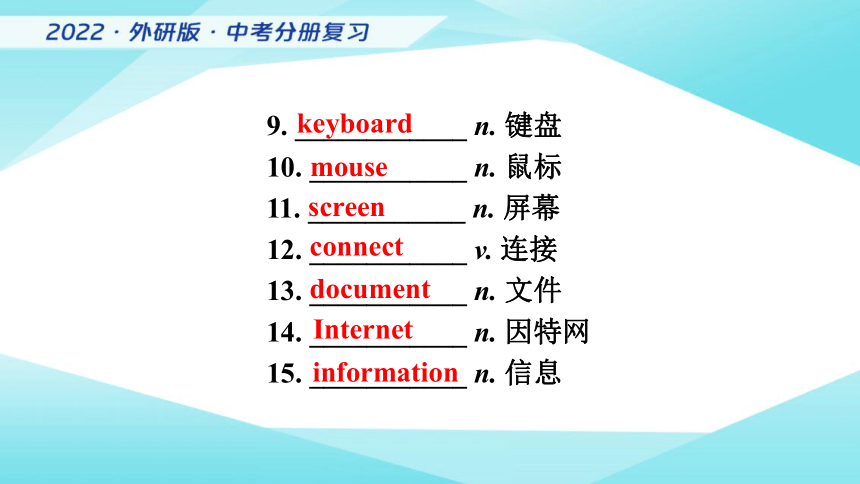
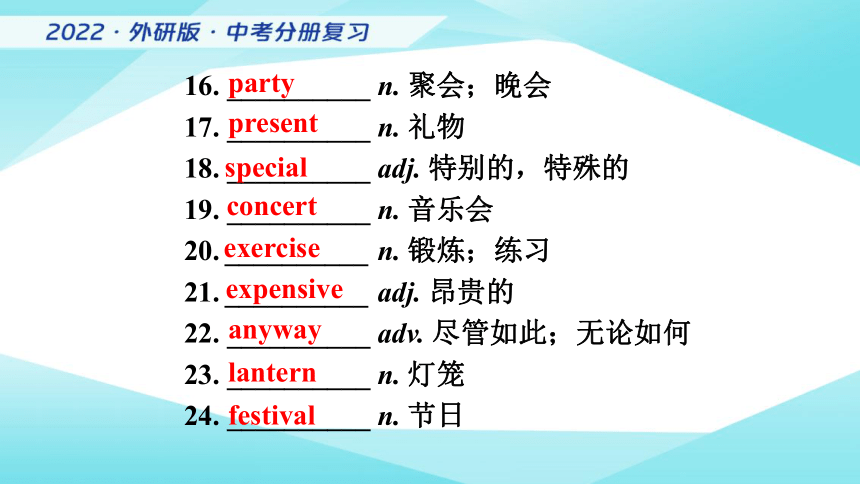
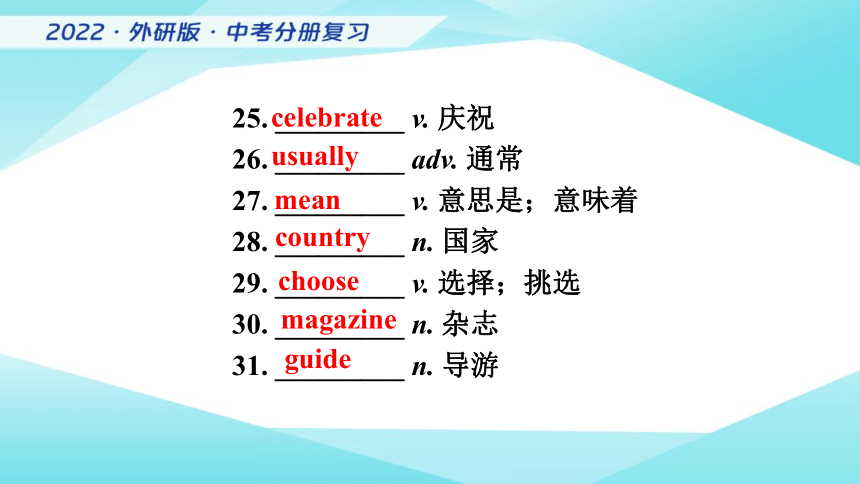
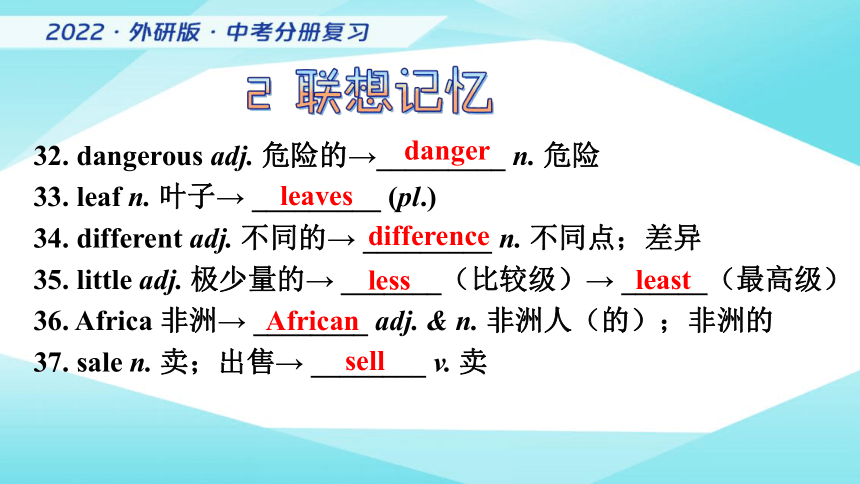
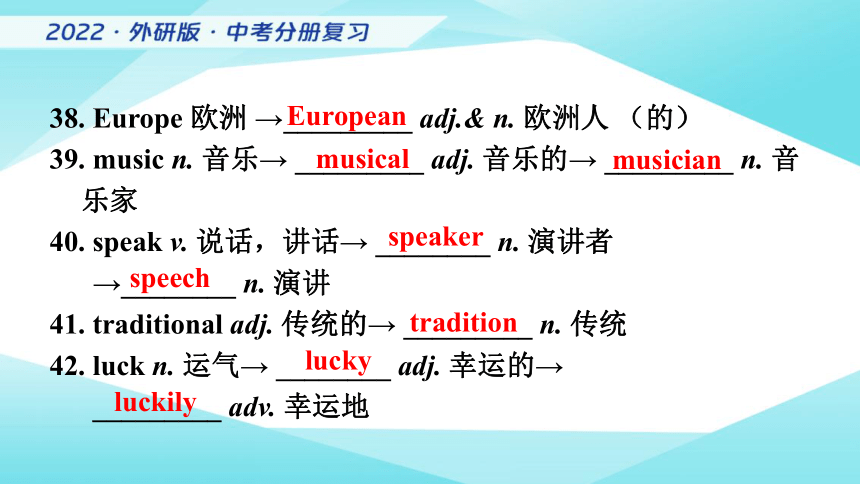
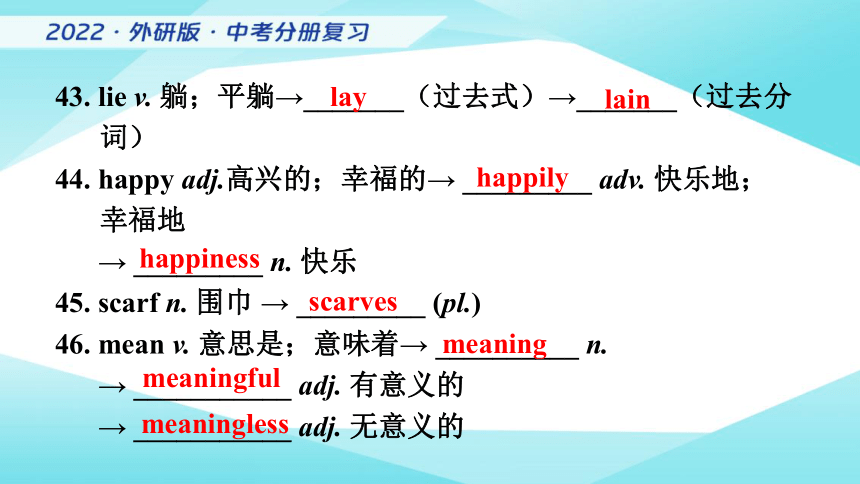
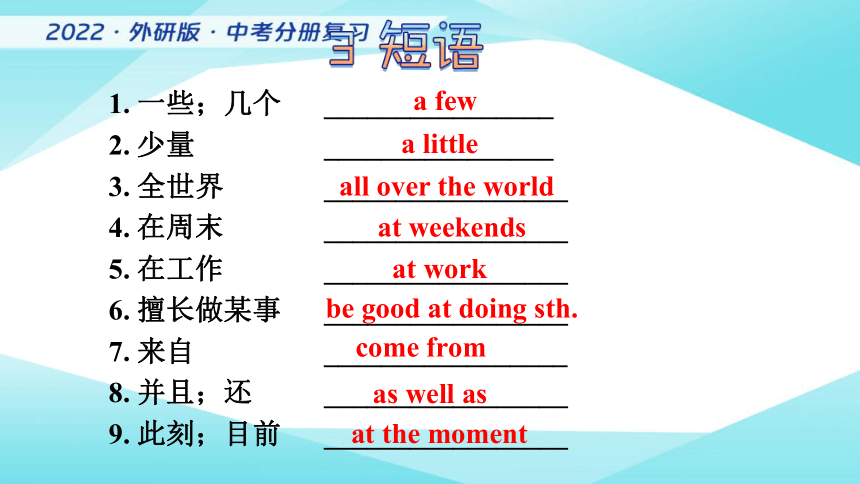
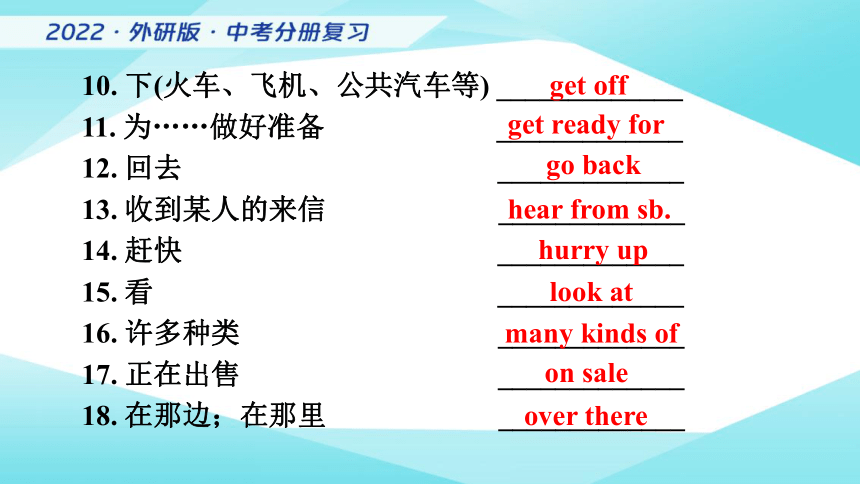
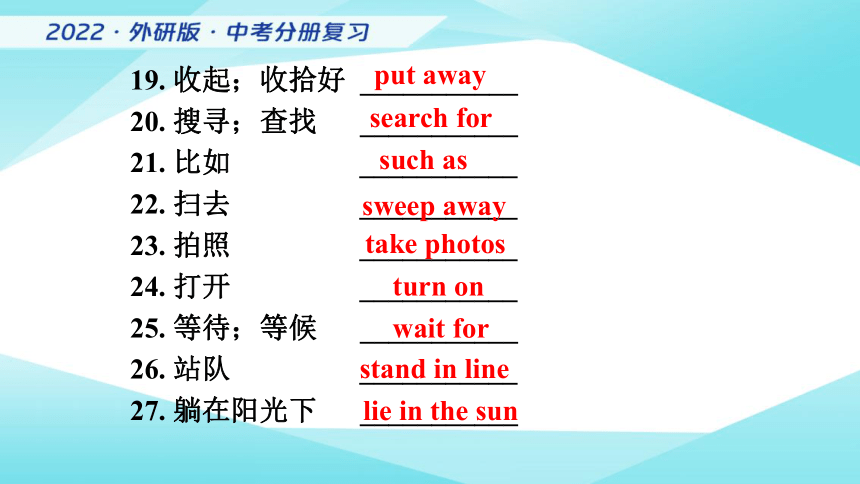
文档简介
(共111张PPT)
外研版七年级上册
Modules 6-10
Presentation
1. ___________ n. 大象
2. ___________ n. 长颈鹿
3. ___________ n. 狮子
4. ___________ n. 动物
5. ___________ adj. 危险的
6. ___________ adj. 可爱的
7. ___________ n. 竹子
8. ___________ adj. 有趣的
elephant
giraffe
lion
animal
dangerous
cute
funny
bamboo
9. ____________ n. 键盘
10. ___________ n. 鼠标
11. ___________ n. 屏幕
12. ___________ v. 连接
13. ___________ n. 文件
14. ___________ n. 因特网
15. ___________ n. 信息
keyboard
screen
document
connect
mouse
Internet
information
16. __________ n. 聚会;晚会
17. __________ n. 礼物
18. __________ adj. 特别的,特殊的
19. __________ n. 音乐会
20. __________ n. 锻炼;练习
21. __________ adj. 昂贵的
22. __________ adv. 尽管如此;无论如何
23. __________ n. 灯笼
24. __________ n. 节日
expensive
exercise
party
special
concert
anyway
present
lantern
festival
25. _________ v. 庆祝
26. _________ adv. 通常
27. _________ v. 意思是;意味着
28. _________ n. 国家
29. _________ v. 选择;挑选
30. _________ n. 杂志
31. _________ n. 导游
mean
celebrate
usually
country
choose
magazine
guide
32. dangerous adj. 危险的→_________ n. 危险
33. leaf n. 叶子→ _________ (pl.)
34. different adj. 不同的→ _________ n. 不同点;差异
35. little adj. 极少量的→ _______(比较级)→ ______(最高级)
36. Africa 非洲→ ________ adj. & n. 非洲人(的);非洲的
37. sale n. 卖;出售→ ________ v. 卖
danger
leaves
difference
less
least
African
sell
38. Europe 欧洲 →_________ adj.& n. 欧洲人 (的)
39. music n. 音乐→ _________ adj. 音乐的→ _________ n. 音乐家
40. speak v. 说话,讲话→ ________ n. 演讲者
→________ n. 演讲
41. traditional adj. 传统的→ _________ n. 传统
42. luck n. 运气→ ________ adj. 幸运的→
_________ adv. 幸运地
European
musical
musician
speaker
speech
tradition
luckily
lucky
43. lie v. 躺;平躺→_______(过去式)→_______(过去分词)
44. happy adj.高兴的;幸福的→ _________ adv. 快乐地;幸福地
→ _________ n. 快乐
45. scarf n. 围巾 → _________ (pl.)
46. mean v. 意思是;意味着→ __________ n.
→ ___________ adj. 有意义的
→ ___________ adj. 无意义的
scarves
meaning
meaningful
meaningless
lay
lain
happily
happiness
1. 一些;几个 ________________
2. 少量 ________________
3. 全世界 _________________
4. 在周末 _________________
5. 在工作 _________________
6. 擅长做某事 _________________
7. 来自 _________________
8. 并且;还 _________________
9. 此刻;目前 _________________
a few
a little
all over the world
at weekends
at work
be good at doing sth.
come from
as well as
at the moment
10. 下(火车、飞机、公共汽车等) _____________
11. 为……做好准备 _____________
12. 回去 _____________
13. 收到某人的来信 _____________
14. 赶快 _____________
15. 看 _____________
16. 许多种类 _____________
17. 正在出售 _____________
18. 在那边;在那里 _____________
get off
go back
get ready for
over there
hear from sb.
hurry up
look at
many kinds of
on sale
19. 收起;收拾好 ___________
20. 搜寻;查找 ___________
21. 比如 ___________
22. 扫去 ___________
23. 拍照 ___________
24. 打开 ___________
25. 等待;等候 ___________
26. 站队 ___________
27. 躺在阳光下 ___________
put away
search for
such as
sweep away
take photos
turn on
wait for
stand in line
lie in the sun
28. 做饭 ___________________
29. 因为 ___________________
30. 搜索信息 ____________________
31. 打开一个新文件 ____________________
32. 保存文件 ____________________
33. 上网 ____________________
34. 发送邮件 ____________________
cook the meal
because of
search for information
open a new document
save the document
go on the Internet
send emails
1. Here are the lions.
2. There she is!
3. How do I write my homework on the computer
4. —Is this it
—Yes. / No.
5. —What’s next
—Next, you write your homework in the new document.
6. —When is it
—This Saturday.
7. —What do you usually do at a Chinese birthday party
—At the birthday dinner, we eat noodles.
8. What would you like for your birthday
9. It’s a secret.
10. I’d like a postcard too.
11. We’re enjoying the school trip a lot.
12. Anyway, it’s time to go back to school now.
13. This is Tony speaking.
14. What’s happening
15. —What are you doing at the moment
—I’m making big red lanterns.
16. —Can I join them
—Of course.
17. Hurry up!
1. different adj. 不同的
【拓展】
different
反义词
be different from… 和……不同
派生词
difference n. 不同;差异
different adv. 不同地
same adj. 相同的
短语
【语境应用】根据所给提示完成句子。
在某些方面,我和我妹妹完全不同。
In some ways, I am quite ________ ________ my sister.
different from
2. other adj. 其他的 (后接可数名词复数形式)
【拓展】
other+复数可数名词=others
泛指剩余中的一部分
the other+复数可数名词= the others
特指剩下的去全部
one…the other…
(两者中)一个……另一个……
other
词条 含义及用法
another 指不确定数目中的另一个,常修饰单数名词。当another表示再、另外的时,可修饰复数名词,但后面大都跟有few或基数词。
other 泛指,另外的、其他的。可修饰单数或复数名词。但修饰单数可数名词时,other前必须有一个限定词(the,any,one,no,some等)。
the other (两个中的)另一个 ;
(三个或三个以上中的)其余的、剩下的
another, other, the other
【语境应用】用another,other或the other完成下列句子。
1) I don’t like this pen. Would you please show me __________
one
2) Here is one of your shoes. Where is __________ one
3) I’ll come again some __________ day.
other
another
the other
3. also adv. 也;而且
词条 含义及用法
also 用于句中,常放在be动词、情态动词或助动词之后,实义动词之前。
too 通常用于肯定句和疑问句句末,与前句有无逗号隔开均可。
either 用于否定句的句末,且一般用逗号与前句隔开。
also, too, either
【语境应用】根据句意用too, either或also填空。
1) —I usually walk to school every morning.
—Li Ming ________ walks to school in the morning.
2) My aunt will go shopping this weekend. My uncle will go shopping, ________.
3) I can’t drive and Mary can’t drive ________.
also
too
either
4. little adj. 极少量的(修饰不可数名词,表否定)
little, a little
词条 含义及用法
little 极少量的,强调几乎没有,表否定意义;
小的,年幼的,常修饰名词。
a little 少量,表肯定意义。它们都用来修饰不可数名词;表示稍微、有点儿时,可修饰形容词。
【语境应用】根据汉语意思完成英语句子。
1) Lucy想喝点儿果汁。
Lucy wants to drink _______ _______ _______.
2) 我有一只小狗。
I have a _______ _______.
3) 今天有点儿热。
It is _______ _______ hot today.
a little juice
little dog
a little
5. alone adv. 独自地
词条 含义及用法
alone 强调客观上独自一人;单独一人,不表示内心的感受。句中多用作表语、状语或宾语补足语,不能作定语。
lonely 强调主观上孤独的;寂寞的,表达了渴望有人陪伴的感情。在句中作表语或定语。
alone, lonely
【语境应用】用alone或lonely完成下列句子。
1) The old man is a ______ person.
2) Are you going there ______
3) The old man doesn’t feel ______ though he is living ______.
alone
lonely
lonely
alone
6. connect v. 连接
connect…to/ with… 把……与……连接
词条(组) 含义及用法
connect A with B 把A与B联系起来或连接在一起,A、B之间不分主次
connect A to B 把A连接在B上,说话者以B为主,以A为辅
connect A with B和 connect A to B
【语境应用】翻译句子。
1) 请把电脑连上网。
2) 这条路将我们村和那个小镇连接起来了。
This road connects our village with that small town.
Please connect the computer to the Internet.
7. turn n. 转动
turn on 打开;接通(电源、电器)
turn短语
turn on 打开
turn off 关闭
turn into 变成;变为
turn in 上交
turn up 调高
turn down 调低
turn on, open
词 (组) 含义及用法
turn on 打开,指转动或推上开关等打开,如turn on the radio / TV / switch (开关) / Internet / computer / iPad / light / camera等。
open 指将原来关上或合上的东西打开,如open the door / window / book等。
【语境应用】完成句子。
1) 请把收音机打开。
Please _______________________________.
2) 打开窗户让新鲜空气进来。
_________________ and let fresh air in.
turn on the radio / turn the radio on
Open the window(s)
8. learn v. 学;学习
learn from sb. 向某人学习
learn to do sth. 学习做某事
learn about 得知;了解
learn短语
【语境应用】完成句子。
1) 对我来说,学习数学并不难。
It’s not difficult for me to ______________.
2) 汉语很有趣,Bob想学它。
Chinese is interesting. Bob wants to ______________.
3) 每天早上,他们都在那儿学习打篮球。
Every morning, they ______________ basketball there.
4) 李华经常帮助别人,我们应该向他学习。
Li Hua often helps others. We should ___________ him.
learn maths
learn it
learn to play
learn from
9. search v. 搜寻;搜索;查找
词(组) 含义及用法
search 本身是及物动词,后面跟sth.时:搜查某处或某物;后面跟sb.时:搜某人的身。
search for 寻找(某人或某物)
search, search for
【语境应用】根据汉语意思完成英语句子。
1) 村民们正帮着在树林里搜寻丢失的孩子。
The villagers are helping to ________ the woods ________
the missing child.
2) 我必须去找那些丢失的钱。
I must ________ ________ the lost money.
3) 警察搜了他的身,找到了丢失的钻石。
The police ________ him and found the lost diamond.
search for
search for
searched
10. information
n. 信息。是不可数名词,不能用an, many等词修饰,可用some, any, much, a lot of等修饰。一条信息:a piece of information。
【拓展】
information后面常接介词on或about, 关于……的信息。
news, message, information
词条 含义及用法
news 消息,新闻,不可数名词,常指报纸、广播、电视等媒体中报道的新闻事件。
message 信息,口信,短信,可数名词,可口头,也可是书面的。
information 信息,消息,资料,不可数名词,多文字消息。
【语境应用】请用news, message或information填空。
1) Can you give me some __________ about trains to London
2) They’re listening to the __________ on the radio.
3) Could you take a __________ for me Please tell Linda I will be late.
message
information
news
sometimes, sometime, some time, some times
词(组) 词性 含义及用法
sometimes adv. “有时;不时;间或”,多用于一般现在时的句子中。
sometime adv. “在某一时候”,表示的时间不确定。
some time 名词短语 在some time中some意为“一些”,time意为“时间”, 因此some time的意思是“一段时间”。
some times 名词短语 在some times中,some意为“一些”,time意为“次数”,因此some times的意思是“几次”。
11. sometimes adv. 有时候;有时
【语境应用】根据句意, 选用some times, some time, sometimes或sometime填空。
1) Mona said she would visit her aunt ____________ next month.
2) The park is a great place. I have been there ____________.
3) Ann usually goes to work by bike, but ____________ by bus.
4) Leila has stayed in the mountains for ____________. She will
stay there for another month.
sometime
some times
sometimes
some time
12. give v. 给,送
give后面常跟双宾语(指人的方向为间接宾语,指物为直接宾语)。
give sb. sth.=give sth. to sb. 给某人某物
注意:若直接宾语为代词时,只能用“give sth. to sb.”结构。
【拓展】与give用法类似的单词还有send, show, pass等。buy, make后面也可以跟双宾语,只是直接宾语在前时,后面的介词要用for。
【语境应用】翻译下列句子。
1) 把那个苹果给你弟弟。
_____________________________________________________
2) 不要把它给小孩子们。
_____________________________________________________
Give the apple to your brother. = Give your brother the apple.
Don't give it to small children.
13. choose v. 选择;挑选
choose后面接名词作宾语。表示选择的范围时,可以根据句
意选用不同的介词,如from, between。
choose between 从两者中选择
choose from 从……中挑选
choose sb. / sth. as sth. 选择某人/某物作为……
choose sb. / sth. to do sth. 选择某人/某物做某事
choose to do sth. 选择做某事
choose, choice
词条 词性 含义及用法
choose v. 及物动词,也可作不及物动词:挑选,选取;决定。
choice n. choose的名词形式:选择;选择权。
make a choice 选择
【语境应用】根据句意用choose的适当形式填空。
1) He faces a difficult ________ between staying at home
and working in another city.
2) There are a lot of places to ________ from for our
summer holiday.
3) At last, Joe ________ to leave.
4) Our childhood experiences may affect our ________ of
jobs.
choice
choose
chose
choice(s)
14. spend v. 花钱;花费
spend+时间/金钱+ (on) doing sth.
花费时间或金钱做某事
spend+时间/金钱+ on sth.
花费时间或金钱在某物上
spend, pay, cost, take
词条 含义及用法
cost 花钱,主语多是事或物。sth. cost(s) sb. + money
pay 花钱,主语是人,和介词for搭配。sb. pay(s) some money for sth.
spend 花时间,花钱,主语是人。sb. spend(s) some money /time on sth. /doing sth.
take 花时间。It takes sb. some time to do sth.
【语境应用】用take, spend, pay或cost的适当形式填空。
1) That new car __________ them lots of money.
2) Mona __________ 50 yuan on the books just now.
3) It usually __________ me an hour to do my homework.
4) You should ________ some time practising your pronunciation.
5) My brother __________ 6,000 yuan for the new computer
yesterday.
cost
spent
takes
spend
paid
原形 中文意思 词性 过去式 过去分词 现在分词
lay 放置;产(卵) vt. laid laid laying
lie 躺;位于 vi. lay lain lying
lie 说谎 vi. lied lied lying
15. lie v. 躺;平躺
【语境应用】根据语境用lie或lay的适当形式填空。
1) Tim is an honest boy. He never _______.
2) My grandma’s hens all _______ eggs yesterday.
3) When the guests came in, I was _______ the table.
4) Shenzhen _______ in the south of China.
5) After long hours’ work, he often _______ on the beach and
has a rest.
6) I wonder who _______ a mobile phone on the table just now.
lies
laid
laying
lies
lies
laid
16. leave
v. 离开
e.g. My baby cries when I leave the room.
Our train leaves at six o’clock.
leave for动身去……,+要去的目的地。
e.g. She leaves for work at 7:30 every morning.
My father is leaving for Beijing next week.
v. 忘带;留下
e.g. I left the keys in the house, so I can’t open the door.
Are you leaving the children with Grandma on Saturday
v. 剩下(多用过去分词形式)
e.g. I have only ten yuan left.
We don’t have much time left.
leave n. 假期;休假,ask for leave请假。
e.g. I asked for three days’ leave last week.
【语境应用】翻译句子。
1) I am leaving for Shanghai next week.
2) I left my schoolbag on the bus this morning.
3) Lily asked for two weeks’ leave.
我下周要动身去上海。
今天早上我把书包落在公交车上了。
Lily请了两周的假。
4) They left Paris four days ago.
5) After we bought that bike, we had only 100 yuan left.
他们四天前离开了巴黎。
我们买了那辆自行车后,就剩下100块钱了。
17. study v. 学习;研究
及物动词:+名词作宾语。可作不及物动词:学习。
study, learn
词条 含义及用法
study 侧重深度研究及深入、系统地学习,强调主观努力学习的动作。
learn 多指初学阶段或模仿性的技术操作,强调学习的结果。
【语境应用】用study,learn适当形式填空。
1) They _______ medicine in the university.
2) She will _______ to ride a horse this year.
study
learn
18. join v. 参加;加入
join…in/ for 和……一起……,和……做伴
词(组) 含义及用法
join 加入某党派、团体、组织、人群等。
take part in 参加活动或比赛,并在其中其积极作用。
attend 参加;出席(会议、婚礼);上(课)等。
join, take part in, attend
【语境应用】用attend,join或take part in的适当形式填空。
1) Robert _____________ the football club in his school two years
ago.
2) Will you _____________ us in the basketball match
3) How many countries will _____________ the 2022 Winter Olympic Games
4) Sara can’t _____________ school tomorrow because she fell off
the bike.
joined
join
take part in
attend
19. hurry v. 匆忙;赶快
【归纳】
hurry up 赶快 (用于祈使句)
hurry to+地点名称 匆忙去某地
hurry to do sth. 匆忙做某事
【拓展】
hurry n. 匆匆忙忙,仓促,赶时间
in a hurry 匆忙地
【语境应用】完成句子。
1) 赶快!他们准备好了。
________ ________! They are ready.
2) 他正匆忙下公交车。
He is getting off the bus ________ ________ ________.
in a hurry
Hurry up
1. as well as 并且,还
连接两个并列成分:除……之外,……也;不但……而且……。强调的是前一项,所以连接两个并列主语时,谓语动词要与第一个保持一致。
as well as还可表示同级比较:和……一样好。
【语境应用】翻译句子。
1) Jack不但喜欢红色,还喜欢蓝色。
2) George和他的许多同学一样,也出国了。
Jack likes blue as well as red.
George, as well as many of his classmates, has gone abroad.
2. be good at 擅长
at后可接名词、代词或v.-ing形式,同义词组为do well in。
be good for, be good at, be good to和be good with
词组 含义用用法
be good for 对……有好处
be good at 擅长……
be good to 后面常接人,对……好
be good with 后接人时:善于和某人相处;
后接其他名词时:善于使用某物。
【语境应用】用be good for, be good at, be good to或be good with完成句子。
1) My sister _______________ speaking English.
2) Walking after dinner _______________ your health.
3) Mothers love their kids and _______________ them.
4) Mr Liu is very clever, and he _______________ his students.
5) Carol and her sister _______________ colors. They paint
very well.
is good at
is good for
are good to
is good with
are good with
3. go back 回去
go back 强调动作be back 返回 (强调状态)
back 短语
get back 回来,返回
come back 回来
call back 回电话
walk back 走回来
walk back 走回来
4. sweep away 扫去
go away 走开;离开
throw away 扔掉;丢弃
give away 捐赠;捐给
take away 带走;拿走
run away 逃跑
blow away 吹走
动词+away
1. —Shall we go and see them
— Yes, let’s go.
Shall we/ I … 我们/ 我……好吗?后接动词原形,
表示征求对方的意见。
肯定回答:Yes, let’s…/ OK./ Good idea./ Sure.
否定回答:No, let’s…
【拓展】表示提出建议的句型还有:
Let’s ... 咱们……吧!
How / What about ... ……好吗?/……行吗?
【语境应用】完成句子。
周日我们去剧院吧?
________ ________ go to the theatre on Sunday
Shall we
【语境应用】对下列句子中的划线部分提问。
1) Their English Day is on October 21st.
2) My cousin is Cindy.
3) I like art because it’s interesting.
4) Bill’s favorite fruits are apples and strawberries.
When is their English day
Who is your cousin
Why do you like art
What are Bill's favorite fruits
2. How do I write my homework on the computer
特殊疑问句结构:特殊疑问词+一般疑问句?
特殊疑问词:how, what, when, where, how many。
3. First, open a new document…Next, you write your homework… then click “save”…Finally…
描述动作过程的先后顺序,常用first, next, then, finally等。
4. Hi, would you like to come to my birthday party
Would you like… 询问对方意见、邀请或请求别人做某事的委婉表达。比同义表达Do you want… 更有礼貌。
肯定句:主语+would like +to do sth.
否定句:主语+would not like+ to do sth.
【注意】
肯定句中,would常与前面的主语缩写’d。
【语境应用】完成句子或对话,每空词数不限。
1) Tom想要些苹果。
Tom ______________________.
2) —你愿意出去吃饭吗?
—是的,我愿意。
—Would you like _____________
—___________________.
would like some apples
to eat out
Yes, I’d like / love to
5. Anyway, it’s time to go back to school now.
anyway adv. 无论如何,反正,不论以何种方式。
用于转换话题或结束谈话。
It’s time to do sth. 到做某事的时间了
It’s time for + n. 到……的时间了
【语境应用】根据汉语意思完成句子,每空词数不限。
1) 她不大礼貌,尽管如此我还是帮助了她。
She wasn’t very polite, but __________________.
2) 多可怕的经历!不管怎样,你现在平安无事,这才是最
重要的。
What a terrible experience! ________________________.
That’s the most important.
I helped her anyway
Anyway, you are safe now
写出句子的同义句,每空一词。
It’s school time.
1) It’s time ________ ________.
2) It’s time ________ ________ ________ ________.
to go to school
for school
6. I’m visiting my friends in Hollywood at the moment…
at the moment 现在,此时
【拓展】
at this moment 在这个时候
at that moment 在那个时候
in a moment 一会儿,马上
【语境应用】翻译句子。
1) 我此刻太忙,没时间和你们去图书馆。
2) Carl没买那本书是因为他当时没钱。
I’m too busy at the moment to go to the library with you.
Carl didn’t buy that book because he had no money at the moment / at that time.
7. This is Tony speaking.
打电话常用语。问对方是谁:Who’s that 或 Who’s that speaking ;回答:This is …或This is …speaking。
【拓展】打电话常用语:
Hello, this is …
May I speak to…please
Who’s that speaking / Who’s that
行为动词的一般现在时
一、行为动词的一般现在时(二)
主语为第三人称单数且谓语动词为行为动词时,一般现在时的句式变化:
1. 肯定句:主语+行为动词第三人称单数形式+其他.;
2. 把肯定句变为否定句时,要在行为动词前加doesn’t,并把
行为动词还原成原形;
3. 把肯定句变为一般疑问句时,在句首加Does,并把行为动词还原成原形。肯定回答:Yes, he / she / it +does.
否定回答:No, he / she / it + doesn’t.
二、行为动词的一般现在时(三)
含有行为动词的一般现在时的特殊疑问句的结构:疑问词+一般疑问句语序(助动词用do或does) (疑问词作主语时除外)。
对时间状语进行提问要用疑问词when;
对地点状语进行提问要用疑问词where;
对可数名词的数量进行提问要用疑问词how many;
对动作进行提问要用疑问词what;
对表示人的词进行提问要用疑问词who。
三、行为动词的一般现在时(四)
1. 一般现在时中常用的频度副词:often, usually, sometimes,
always和never,频率由高到低依次为always > usually > often > sometimes > never。
2. 频度副词常放在行为动词前,但sometimes既可放在句中,又可放在句首或句尾。
现在进行时
现在进行时表示正在进行的动作,主要表现在谓语动词的形式上:be(am, is , are)+动词-ing。
1. 动词-ing形式的构成
1) 直接在动词原形后加-ing。如:work→ working
2) 以不发音的字母e结尾的动词,先去e,再加-ing。如:
leave→ leaving
3) 以“辅音字母+元音字母+辅音字母”的重读闭音节结
尾的动词,如末尾只有一个辅音字母,应双写这个辅
音字母,再加-ing。如:get→ getting
2. 句式结构
句式 结构
肯定句 主语+be(am, is, are)+动词-ing形式(+其他).
否定句 主语+be(am, is, are)+not+动词-ing形式(+其他).
一般疑问句 Be(Am, Is, Are)+主语+动词-ing形式(+其他)
特殊疑问句 疑问词+be(am, is, are) +主语+动词-ing形式(+其他) (疑问词作主语时除外)
3. 时态标志
现在进行时的标志词:now, these days和at the moment等。 以Look! Listen!等开头的句子也常用现在进行时。
1. Listen! Our science teacher _______ the use of the robot.
(2021重庆)
A. explains B. explained C. is explaining D. has explained
2. —Where is Mum
—In the living room. She ______ a book at the moment.
(2021天津)
A. was reading B. will read
C. is reading D. has read
C
C
3. The spirit of the ox (牛) _______ an important role for China’s development this year. (2021四川成都)
A. is playing B. was playing C. played
4. —Jerry, can you give me a hand
—Just a minute. I ______ an e-mail. (2021海南)
A. have sent B. am sending C. was sending
A
B
5. Livestreaming (直播)_______ a new chance for traditional
culture artists. (2020内蒙古呼和浩特)
A. practices B. provides C. promises D. protects
6. —Be quick, Sara! The taxi is waiting for us outside.
—A moment, please. I _______ some visitors our products.
(2020辽宁营口)
A. showed B. am showing C. was showing D. show
B
B
7. —Look! The children _______.
—How happy they are! (2020辽宁丹东)
A. was dancing B. danced
C. are dancing D. dances
8. —Jack, I am busy doing the washing. Can you give me a hand
—Wait a moment. I _______ the bed. (2020四川凉山)
A. am making B. will make
C. was making D. have made
C
A
一、时间(Time)
频度(Frequency)
A: How often do you go to the bookshop
B: Once / Twice / Three times a week/month.
A: How often does your grandpa go swimming
B: Never / Seldom / Sometimes / Often / Usually / Always.
顺序(Sequence)
A: How do you make tomato with sugar
B: First, wash the tomatoes and cut the tomatoes into pieces. Next, put them into a plate. Then, add some sugar to them. Finally, mix them up.
二、社会交往(Social communications)
邀请(Invitation)
A: Can you go to the zoo with me
B: Sure / Yes, I'd like/love to. (接受)
Sorry, I'm afraid I can't. I must study for a maths test. (拒绝)
A: Would you like to join me for a walk
B: OK, I'd like/love to. (接受)
I'd like/love to, but I have to visit my grandmother. (拒绝)
A: May I invite you to dinner this evening
B: Thank you / Thanks for your kind invitation. (接受)
That's very kind of you / It's very nice of you, but I can't accept your invitation. I have other plans. (拒绝)
【写作任务】
假如你是李华,打算邀请你们的外教Jack来你家共度端午佳节,并观看一年一度的龙舟赛。请根据以下要点,用英语给他写一封电子邮件。
要点:1. 端午节的时间(农历五月五日)、来由(纪念屈原);
2. 活动安排:学包粽子、观看龙舟赛(时间:下午两点;
地点:东坡湖;赛况)。
参考词汇:农历 lunar calendar
节假日活动——节日与假日
注意:
1. 所写内容必须包含所有要点,并作适当发挥;
2. 词数:80词左右(开头、结尾已给出,不计入总词数);
3. 文中不得出现真实姓名、学校等信息。
【思路点拨】
1. 定基调
体裁:应用文——书信;主体内容为说明文
时态:以一般现在时和一般将来时为主
人称:以第一人称为主
2. 谋布局、写句子
I’m writing to invite you to spend the festival with my family
We are going to / will try to make zongzi
We are going to / will watch the boat races
people on each bank cheer up
I’m sure you’ll have a fantastic / wonderful / great day
3. 巧衔接
在介绍节日活动时,可以用表示时间顺序的词语来衔接上下文,如:in the morning on that day, in the afternoon, during the exciting races,这些词语的使用可以使节日活动的描述显得连贯、自然,从而使文章成为一个有机统一体。
4. 成篇章
Dear Jack,
The Dragon Boat Festival is coming in a few days. __________
____________________________________________________________________________________________________________
Looking forward to your reply.
Yours,
Li Hua
5. 化“平凡”为“非凡”
To remember Qu Yuan, Chinese people have been celebrating it on May 5th of the lunar calendar for centuries. → The festival has been celebrated on May 5th of the lunar calendar for centuries in memory of the great poet Qu Yuan.
Dear Jack,
The Dragon Boat Festival is coming in a few days. I’m writing to invite you to spend the festival with my family. To remember Qu Yuan, Chinese people have been celebrating it on May 5th of the lunar calendar for centuries. In the morning on that day, we’ll try to make zongzi with my grandma’s help.
In the afternoon, we are going to watch the boat races held in Dongpo Lake at 2 o’clock. During the exciting races, the dragon boat teams compete with each other while people on each bank cheer up. I’m sure you’ll have a fantastic day.
Looking forward to your reply.
Yours,
Li Hua
Ⅰ. 根据语境及所给汉语提示语写出所缺单词。
1. They made this dress in four _________(不同的) colors.
2. I _________(共用) a house with four other students when I was at school.
3. The doctor advised him to take more _________(锻炼).
4. A new _________(饭店) has just opened across the road.
5. You can enjoy a sport without _________(加入) a club.
different
shared
exercise
restaurant
joining
Ⅱ. 根据语境及所给首字母提示补全所缺单词。
1. Mike bought two t________. He invited me to watch the movie.
2. My brother really enjoys l________ on the beach.
3. You must c________ your homework more carefully before handing it in. It's full of mistakes.
4. I threw a ball to her and she c________ it.
5. A dictionary tells you what words m________.
tickets
lying
check
caught
mean
Ⅲ. 根据语境从方框中选择恰当的短语填空。
look at, hurry up, put away, search for, get ready for
1. The teacher asked us _____________ the blackboard.
2. Molly ____________ some information about the space on the Internet just now.
3. ____________ your clothes! Look! It's not tidy in your room.
4. The sports meeting will be held next week. We must _____________ it.
5. _____________, or we'll be late for the class.
to look at
searched for
Put away
get ready for
Hurry up
IV.根据上句完成下句,使两句意思相同或相近。
1. The old man is from Shanghai.
The old man ________ ________ Shanghai.
2. Emma was very glad to receive a letter from her old classmate.
Emma was very glad to ________ ________ her old classmate.
3. Alice sings very well.
Alice ________ ________ ________ singing.
4. My cousin walked to the museum yesterday.
My cousin went to the museum ________ ________ yesterday.
5. David sent the travel plan to me.
David ________ ________ the travel plan.
comes from
hear from
is good at
on foot
sent me
V. 根据汉语意思完成英语句子,每空一词。
1. Grace明天不工作。
Grace won't be ________ ________ tomorrow.
2. 让我把碎玻璃扫干净。
Let me ________ ________ the broken glass.
3. John去动物园给猴子拍了照片。
John went to the zoo and ________ ________ for monkeys.
4. Eric进入房间后打开了灯。
Eric ________ ________ the light after he entered the room.
5. 这种T恤在这家商店出售。
This kind of T-shirt is ________ ________ in this shop.
at work
sweep away
took photos
turned on
on sale
VI. 从题后所给的选项中选择可以填入空白处的最佳答案。
1. —Would you like to come to my birthday party tonight
—________
A. Yes, I'd like to. B. It doesn't matter.
C. Have a good time! D. You're welcome.
2. —________
—I am. I want this pair of shoes, please.
—Sure. That's¥180.
A. Do you sell jackets B. Who's next, please
C. Is there a shop near here D. What can I do for you
A
B
3. —________, Mary
—Once a week.
A. Where is the park
B. How often do you go to the park
C. What is the park like
D. How far is the park from here
B
VII. 阅读短文,从方框中选择恰当的单词并用其适当形式填
空,使短文通顺,意思完整,每词限用一次。
they, age, energy, different, become, stop, good, make, take, if
As a child, what did you want to be when you grew up Maybe you dreamed of flying into space or (1)________ a famous actor. Then perhaps over the years, your dreams have become more realistic (现实的). Or you might have given (2)________ up.
If so, then 13th January is the day for you. It is Make Your Dreams Come True Day. If you've been putting off achieving your dreams, this is the day (3)________ a fresh start.
becoming
them
to make
they, age, energy, different, become, stop, good, make, take, if
It's important to dream because dreams can give us the (4)_________ to succeed in life. Dreams encourage us to work hard to make them come true. And the (5)_________ way to do that is by setting goals (目标). What is the (6)_________ between a dream and a goal It's been said that dreams are the final destination (目的地 ); goals are the (7)_________ along the way.
Many successful people have spoken about dreams. Colin Powell once said, “A dream doesn't become reality through magic; it (8)_________ determination and hard work.”
energy
best
difference
stops
takes
they, age, energy, different, become, stop, good, make, take, if
Les Brown told us that dreams have nothing to do with (9)________. “You are never too old to dream a new dream.”
(10)________ you have been dreaming about doing something for years, start now. Then you'll be on your way to making your dreams come true.
age
If
https://www.21cnjy.com/help/help_extract.php
外研版七年级上册
Modules 6-10
Presentation
1. ___________ n. 大象
2. ___________ n. 长颈鹿
3. ___________ n. 狮子
4. ___________ n. 动物
5. ___________ adj. 危险的
6. ___________ adj. 可爱的
7. ___________ n. 竹子
8. ___________ adj. 有趣的
elephant
giraffe
lion
animal
dangerous
cute
funny
bamboo
9. ____________ n. 键盘
10. ___________ n. 鼠标
11. ___________ n. 屏幕
12. ___________ v. 连接
13. ___________ n. 文件
14. ___________ n. 因特网
15. ___________ n. 信息
keyboard
screen
document
connect
mouse
Internet
information
16. __________ n. 聚会;晚会
17. __________ n. 礼物
18. __________ adj. 特别的,特殊的
19. __________ n. 音乐会
20. __________ n. 锻炼;练习
21. __________ adj. 昂贵的
22. __________ adv. 尽管如此;无论如何
23. __________ n. 灯笼
24. __________ n. 节日
expensive
exercise
party
special
concert
anyway
present
lantern
festival
25. _________ v. 庆祝
26. _________ adv. 通常
27. _________ v. 意思是;意味着
28. _________ n. 国家
29. _________ v. 选择;挑选
30. _________ n. 杂志
31. _________ n. 导游
mean
celebrate
usually
country
choose
magazine
guide
32. dangerous adj. 危险的→_________ n. 危险
33. leaf n. 叶子→ _________ (pl.)
34. different adj. 不同的→ _________ n. 不同点;差异
35. little adj. 极少量的→ _______(比较级)→ ______(最高级)
36. Africa 非洲→ ________ adj. & n. 非洲人(的);非洲的
37. sale n. 卖;出售→ ________ v. 卖
danger
leaves
difference
less
least
African
sell
38. Europe 欧洲 →_________ adj.& n. 欧洲人 (的)
39. music n. 音乐→ _________ adj. 音乐的→ _________ n. 音乐家
40. speak v. 说话,讲话→ ________ n. 演讲者
→________ n. 演讲
41. traditional adj. 传统的→ _________ n. 传统
42. luck n. 运气→ ________ adj. 幸运的→
_________ adv. 幸运地
European
musical
musician
speaker
speech
tradition
luckily
lucky
43. lie v. 躺;平躺→_______(过去式)→_______(过去分词)
44. happy adj.高兴的;幸福的→ _________ adv. 快乐地;幸福地
→ _________ n. 快乐
45. scarf n. 围巾 → _________ (pl.)
46. mean v. 意思是;意味着→ __________ n.
→ ___________ adj. 有意义的
→ ___________ adj. 无意义的
scarves
meaning
meaningful
meaningless
lay
lain
happily
happiness
1. 一些;几个 ________________
2. 少量 ________________
3. 全世界 _________________
4. 在周末 _________________
5. 在工作 _________________
6. 擅长做某事 _________________
7. 来自 _________________
8. 并且;还 _________________
9. 此刻;目前 _________________
a few
a little
all over the world
at weekends
at work
be good at doing sth.
come from
as well as
at the moment
10. 下(火车、飞机、公共汽车等) _____________
11. 为……做好准备 _____________
12. 回去 _____________
13. 收到某人的来信 _____________
14. 赶快 _____________
15. 看 _____________
16. 许多种类 _____________
17. 正在出售 _____________
18. 在那边;在那里 _____________
get off
go back
get ready for
over there
hear from sb.
hurry up
look at
many kinds of
on sale
19. 收起;收拾好 ___________
20. 搜寻;查找 ___________
21. 比如 ___________
22. 扫去 ___________
23. 拍照 ___________
24. 打开 ___________
25. 等待;等候 ___________
26. 站队 ___________
27. 躺在阳光下 ___________
put away
search for
such as
sweep away
take photos
turn on
wait for
stand in line
lie in the sun
28. 做饭 ___________________
29. 因为 ___________________
30. 搜索信息 ____________________
31. 打开一个新文件 ____________________
32. 保存文件 ____________________
33. 上网 ____________________
34. 发送邮件 ____________________
cook the meal
because of
search for information
open a new document
save the document
go on the Internet
send emails
1. Here are the lions.
2. There she is!
3. How do I write my homework on the computer
4. —Is this it
—Yes. / No.
5. —What’s next
—Next, you write your homework in the new document.
6. —When is it
—This Saturday.
7. —What do you usually do at a Chinese birthday party
—At the birthday dinner, we eat noodles.
8. What would you like for your birthday
9. It’s a secret.
10. I’d like a postcard too.
11. We’re enjoying the school trip a lot.
12. Anyway, it’s time to go back to school now.
13. This is Tony speaking.
14. What’s happening
15. —What are you doing at the moment
—I’m making big red lanterns.
16. —Can I join them
—Of course.
17. Hurry up!
1. different adj. 不同的
【拓展】
different
反义词
be different from… 和……不同
派生词
difference n. 不同;差异
different adv. 不同地
same adj. 相同的
短语
【语境应用】根据所给提示完成句子。
在某些方面,我和我妹妹完全不同。
In some ways, I am quite ________ ________ my sister.
different from
2. other adj. 其他的 (后接可数名词复数形式)
【拓展】
other+复数可数名词=others
泛指剩余中的一部分
the other+复数可数名词= the others
特指剩下的去全部
one…the other…
(两者中)一个……另一个……
other
词条 含义及用法
another 指不确定数目中的另一个,常修饰单数名词。当another表示再、另外的时,可修饰复数名词,但后面大都跟有few或基数词。
other 泛指,另外的、其他的。可修饰单数或复数名词。但修饰单数可数名词时,other前必须有一个限定词(the,any,one,no,some等)。
the other (两个中的)另一个 ;
(三个或三个以上中的)其余的、剩下的
another, other, the other
【语境应用】用another,other或the other完成下列句子。
1) I don’t like this pen. Would you please show me __________
one
2) Here is one of your shoes. Where is __________ one
3) I’ll come again some __________ day.
other
another
the other
3. also adv. 也;而且
词条 含义及用法
also 用于句中,常放在be动词、情态动词或助动词之后,实义动词之前。
too 通常用于肯定句和疑问句句末,与前句有无逗号隔开均可。
either 用于否定句的句末,且一般用逗号与前句隔开。
also, too, either
【语境应用】根据句意用too, either或also填空。
1) —I usually walk to school every morning.
—Li Ming ________ walks to school in the morning.
2) My aunt will go shopping this weekend. My uncle will go shopping, ________.
3) I can’t drive and Mary can’t drive ________.
also
too
either
4. little adj. 极少量的(修饰不可数名词,表否定)
little, a little
词条 含义及用法
little 极少量的,强调几乎没有,表否定意义;
小的,年幼的,常修饰名词。
a little 少量,表肯定意义。它们都用来修饰不可数名词;表示稍微、有点儿时,可修饰形容词。
【语境应用】根据汉语意思完成英语句子。
1) Lucy想喝点儿果汁。
Lucy wants to drink _______ _______ _______.
2) 我有一只小狗。
I have a _______ _______.
3) 今天有点儿热。
It is _______ _______ hot today.
a little juice
little dog
a little
5. alone adv. 独自地
词条 含义及用法
alone 强调客观上独自一人;单独一人,不表示内心的感受。句中多用作表语、状语或宾语补足语,不能作定语。
lonely 强调主观上孤独的;寂寞的,表达了渴望有人陪伴的感情。在句中作表语或定语。
alone, lonely
【语境应用】用alone或lonely完成下列句子。
1) The old man is a ______ person.
2) Are you going there ______
3) The old man doesn’t feel ______ though he is living ______.
alone
lonely
lonely
alone
6. connect v. 连接
connect…to/ with… 把……与……连接
词条(组) 含义及用法
connect A with B 把A与B联系起来或连接在一起,A、B之间不分主次
connect A to B 把A连接在B上,说话者以B为主,以A为辅
connect A with B和 connect A to B
【语境应用】翻译句子。
1) 请把电脑连上网。
2) 这条路将我们村和那个小镇连接起来了。
This road connects our village with that small town.
Please connect the computer to the Internet.
7. turn n. 转动
turn on 打开;接通(电源、电器)
turn短语
turn on 打开
turn off 关闭
turn into 变成;变为
turn in 上交
turn up 调高
turn down 调低
turn on, open
词 (组) 含义及用法
turn on 打开,指转动或推上开关等打开,如turn on the radio / TV / switch (开关) / Internet / computer / iPad / light / camera等。
open 指将原来关上或合上的东西打开,如open the door / window / book等。
【语境应用】完成句子。
1) 请把收音机打开。
Please _______________________________.
2) 打开窗户让新鲜空气进来。
_________________ and let fresh air in.
turn on the radio / turn the radio on
Open the window(s)
8. learn v. 学;学习
learn from sb. 向某人学习
learn to do sth. 学习做某事
learn about 得知;了解
learn短语
【语境应用】完成句子。
1) 对我来说,学习数学并不难。
It’s not difficult for me to ______________.
2) 汉语很有趣,Bob想学它。
Chinese is interesting. Bob wants to ______________.
3) 每天早上,他们都在那儿学习打篮球。
Every morning, they ______________ basketball there.
4) 李华经常帮助别人,我们应该向他学习。
Li Hua often helps others. We should ___________ him.
learn maths
learn it
learn to play
learn from
9. search v. 搜寻;搜索;查找
词(组) 含义及用法
search 本身是及物动词,后面跟sth.时:搜查某处或某物;后面跟sb.时:搜某人的身。
search for 寻找(某人或某物)
search, search for
【语境应用】根据汉语意思完成英语句子。
1) 村民们正帮着在树林里搜寻丢失的孩子。
The villagers are helping to ________ the woods ________
the missing child.
2) 我必须去找那些丢失的钱。
I must ________ ________ the lost money.
3) 警察搜了他的身,找到了丢失的钻石。
The police ________ him and found the lost diamond.
search for
search for
searched
10. information
n. 信息。是不可数名词,不能用an, many等词修饰,可用some, any, much, a lot of等修饰。一条信息:a piece of information。
【拓展】
information后面常接介词on或about, 关于……的信息。
news, message, information
词条 含义及用法
news 消息,新闻,不可数名词,常指报纸、广播、电视等媒体中报道的新闻事件。
message 信息,口信,短信,可数名词,可口头,也可是书面的。
information 信息,消息,资料,不可数名词,多文字消息。
【语境应用】请用news, message或information填空。
1) Can you give me some __________ about trains to London
2) They’re listening to the __________ on the radio.
3) Could you take a __________ for me Please tell Linda I will be late.
message
information
news
sometimes, sometime, some time, some times
词(组) 词性 含义及用法
sometimes adv. “有时;不时;间或”,多用于一般现在时的句子中。
sometime adv. “在某一时候”,表示的时间不确定。
some time 名词短语 在some time中some意为“一些”,time意为“时间”, 因此some time的意思是“一段时间”。
some times 名词短语 在some times中,some意为“一些”,time意为“次数”,因此some times的意思是“几次”。
11. sometimes adv. 有时候;有时
【语境应用】根据句意, 选用some times, some time, sometimes或sometime填空。
1) Mona said she would visit her aunt ____________ next month.
2) The park is a great place. I have been there ____________.
3) Ann usually goes to work by bike, but ____________ by bus.
4) Leila has stayed in the mountains for ____________. She will
stay there for another month.
sometime
some times
sometimes
some time
12. give v. 给,送
give后面常跟双宾语(指人的方向为间接宾语,指物为直接宾语)。
give sb. sth.=give sth. to sb. 给某人某物
注意:若直接宾语为代词时,只能用“give sth. to sb.”结构。
【拓展】与give用法类似的单词还有send, show, pass等。buy, make后面也可以跟双宾语,只是直接宾语在前时,后面的介词要用for。
【语境应用】翻译下列句子。
1) 把那个苹果给你弟弟。
_____________________________________________________
2) 不要把它给小孩子们。
_____________________________________________________
Give the apple to your brother. = Give your brother the apple.
Don't give it to small children.
13. choose v. 选择;挑选
choose后面接名词作宾语。表示选择的范围时,可以根据句
意选用不同的介词,如from, between。
choose between 从两者中选择
choose from 从……中挑选
choose sb. / sth. as sth. 选择某人/某物作为……
choose sb. / sth. to do sth. 选择某人/某物做某事
choose to do sth. 选择做某事
choose, choice
词条 词性 含义及用法
choose v. 及物动词,也可作不及物动词:挑选,选取;决定。
choice n. choose的名词形式:选择;选择权。
make a choice 选择
【语境应用】根据句意用choose的适当形式填空。
1) He faces a difficult ________ between staying at home
and working in another city.
2) There are a lot of places to ________ from for our
summer holiday.
3) At last, Joe ________ to leave.
4) Our childhood experiences may affect our ________ of
jobs.
choice
choose
chose
choice(s)
14. spend v. 花钱;花费
spend+时间/金钱+ (on) doing sth.
花费时间或金钱做某事
spend+时间/金钱+ on sth.
花费时间或金钱在某物上
spend, pay, cost, take
词条 含义及用法
cost 花钱,主语多是事或物。sth. cost(s) sb. + money
pay 花钱,主语是人,和介词for搭配。sb. pay(s) some money for sth.
spend 花时间,花钱,主语是人。sb. spend(s) some money /time on sth. /doing sth.
take 花时间。It takes sb. some time to do sth.
【语境应用】用take, spend, pay或cost的适当形式填空。
1) That new car __________ them lots of money.
2) Mona __________ 50 yuan on the books just now.
3) It usually __________ me an hour to do my homework.
4) You should ________ some time practising your pronunciation.
5) My brother __________ 6,000 yuan for the new computer
yesterday.
cost
spent
takes
spend
paid
原形 中文意思 词性 过去式 过去分词 现在分词
lay 放置;产(卵) vt. laid laid laying
lie 躺;位于 vi. lay lain lying
lie 说谎 vi. lied lied lying
15. lie v. 躺;平躺
【语境应用】根据语境用lie或lay的适当形式填空。
1) Tim is an honest boy. He never _______.
2) My grandma’s hens all _______ eggs yesterday.
3) When the guests came in, I was _______ the table.
4) Shenzhen _______ in the south of China.
5) After long hours’ work, he often _______ on the beach and
has a rest.
6) I wonder who _______ a mobile phone on the table just now.
lies
laid
laying
lies
lies
laid
16. leave
v. 离开
e.g. My baby cries when I leave the room.
Our train leaves at six o’clock.
leave for动身去……,+要去的目的地。
e.g. She leaves for work at 7:30 every morning.
My father is leaving for Beijing next week.
v. 忘带;留下
e.g. I left the keys in the house, so I can’t open the door.
Are you leaving the children with Grandma on Saturday
v. 剩下(多用过去分词形式)
e.g. I have only ten yuan left.
We don’t have much time left.
leave n. 假期;休假,ask for leave请假。
e.g. I asked for three days’ leave last week.
【语境应用】翻译句子。
1) I am leaving for Shanghai next week.
2) I left my schoolbag on the bus this morning.
3) Lily asked for two weeks’ leave.
我下周要动身去上海。
今天早上我把书包落在公交车上了。
Lily请了两周的假。
4) They left Paris four days ago.
5) After we bought that bike, we had only 100 yuan left.
他们四天前离开了巴黎。
我们买了那辆自行车后,就剩下100块钱了。
17. study v. 学习;研究
及物动词:+名词作宾语。可作不及物动词:学习。
study, learn
词条 含义及用法
study 侧重深度研究及深入、系统地学习,强调主观努力学习的动作。
learn 多指初学阶段或模仿性的技术操作,强调学习的结果。
【语境应用】用study,learn适当形式填空。
1) They _______ medicine in the university.
2) She will _______ to ride a horse this year.
study
learn
18. join v. 参加;加入
join…in/ for 和……一起……,和……做伴
词(组) 含义及用法
join 加入某党派、团体、组织、人群等。
take part in 参加活动或比赛,并在其中其积极作用。
attend 参加;出席(会议、婚礼);上(课)等。
join, take part in, attend
【语境应用】用attend,join或take part in的适当形式填空。
1) Robert _____________ the football club in his school two years
ago.
2) Will you _____________ us in the basketball match
3) How many countries will _____________ the 2022 Winter Olympic Games
4) Sara can’t _____________ school tomorrow because she fell off
the bike.
joined
join
take part in
attend
19. hurry v. 匆忙;赶快
【归纳】
hurry up 赶快 (用于祈使句)
hurry to+地点名称 匆忙去某地
hurry to do sth. 匆忙做某事
【拓展】
hurry n. 匆匆忙忙,仓促,赶时间
in a hurry 匆忙地
【语境应用】完成句子。
1) 赶快!他们准备好了。
________ ________! They are ready.
2) 他正匆忙下公交车。
He is getting off the bus ________ ________ ________.
in a hurry
Hurry up
1. as well as 并且,还
连接两个并列成分:除……之外,……也;不但……而且……。强调的是前一项,所以连接两个并列主语时,谓语动词要与第一个保持一致。
as well as还可表示同级比较:和……一样好。
【语境应用】翻译句子。
1) Jack不但喜欢红色,还喜欢蓝色。
2) George和他的许多同学一样,也出国了。
Jack likes blue as well as red.
George, as well as many of his classmates, has gone abroad.
2. be good at 擅长
at后可接名词、代词或v.-ing形式,同义词组为do well in。
be good for, be good at, be good to和be good with
词组 含义用用法
be good for 对……有好处
be good at 擅长……
be good to 后面常接人,对……好
be good with 后接人时:善于和某人相处;
后接其他名词时:善于使用某物。
【语境应用】用be good for, be good at, be good to或be good with完成句子。
1) My sister _______________ speaking English.
2) Walking after dinner _______________ your health.
3) Mothers love their kids and _______________ them.
4) Mr Liu is very clever, and he _______________ his students.
5) Carol and her sister _______________ colors. They paint
very well.
is good at
is good for
are good to
is good with
are good with
3. go back 回去
go back 强调动作be back 返回 (强调状态)
back 短语
get back 回来,返回
come back 回来
call back 回电话
walk back 走回来
walk back 走回来
4. sweep away 扫去
go away 走开;离开
throw away 扔掉;丢弃
give away 捐赠;捐给
take away 带走;拿走
run away 逃跑
blow away 吹走
动词+away
1. —Shall we go and see them
— Yes, let’s go.
Shall we/ I … 我们/ 我……好吗?后接动词原形,
表示征求对方的意见。
肯定回答:Yes, let’s…/ OK./ Good idea./ Sure.
否定回答:No, let’s…
【拓展】表示提出建议的句型还有:
Let’s ... 咱们……吧!
How / What about ... ……好吗?/……行吗?
【语境应用】完成句子。
周日我们去剧院吧?
________ ________ go to the theatre on Sunday
Shall we
【语境应用】对下列句子中的划线部分提问。
1) Their English Day is on October 21st.
2) My cousin is Cindy.
3) I like art because it’s interesting.
4) Bill’s favorite fruits are apples and strawberries.
When is their English day
Who is your cousin
Why do you like art
What are Bill's favorite fruits
2. How do I write my homework on the computer
特殊疑问句结构:特殊疑问词+一般疑问句?
特殊疑问词:how, what, when, where, how many。
3. First, open a new document…Next, you write your homework… then click “save”…Finally…
描述动作过程的先后顺序,常用first, next, then, finally等。
4. Hi, would you like to come to my birthday party
Would you like… 询问对方意见、邀请或请求别人做某事的委婉表达。比同义表达Do you want… 更有礼貌。
肯定句:主语+would like +to do sth.
否定句:主语+would not like+ to do sth.
【注意】
肯定句中,would常与前面的主语缩写’d。
【语境应用】完成句子或对话,每空词数不限。
1) Tom想要些苹果。
Tom ______________________.
2) —你愿意出去吃饭吗?
—是的,我愿意。
—Would you like _____________
—___________________.
would like some apples
to eat out
Yes, I’d like / love to
5. Anyway, it’s time to go back to school now.
anyway adv. 无论如何,反正,不论以何种方式。
用于转换话题或结束谈话。
It’s time to do sth. 到做某事的时间了
It’s time for + n. 到……的时间了
【语境应用】根据汉语意思完成句子,每空词数不限。
1) 她不大礼貌,尽管如此我还是帮助了她。
She wasn’t very polite, but __________________.
2) 多可怕的经历!不管怎样,你现在平安无事,这才是最
重要的。
What a terrible experience! ________________________.
That’s the most important.
I helped her anyway
Anyway, you are safe now
写出句子的同义句,每空一词。
It’s school time.
1) It’s time ________ ________.
2) It’s time ________ ________ ________ ________.
to go to school
for school
6. I’m visiting my friends in Hollywood at the moment…
at the moment 现在,此时
【拓展】
at this moment 在这个时候
at that moment 在那个时候
in a moment 一会儿,马上
【语境应用】翻译句子。
1) 我此刻太忙,没时间和你们去图书馆。
2) Carl没买那本书是因为他当时没钱。
I’m too busy at the moment to go to the library with you.
Carl didn’t buy that book because he had no money at the moment / at that time.
7. This is Tony speaking.
打电话常用语。问对方是谁:Who’s that 或 Who’s that speaking ;回答:This is …或This is …speaking。
【拓展】打电话常用语:
Hello, this is …
May I speak to…please
Who’s that speaking / Who’s that
行为动词的一般现在时
一、行为动词的一般现在时(二)
主语为第三人称单数且谓语动词为行为动词时,一般现在时的句式变化:
1. 肯定句:主语+行为动词第三人称单数形式+其他.;
2. 把肯定句变为否定句时,要在行为动词前加doesn’t,并把
行为动词还原成原形;
3. 把肯定句变为一般疑问句时,在句首加Does,并把行为动词还原成原形。肯定回答:Yes, he / she / it +does.
否定回答:No, he / she / it + doesn’t.
二、行为动词的一般现在时(三)
含有行为动词的一般现在时的特殊疑问句的结构:疑问词+一般疑问句语序(助动词用do或does) (疑问词作主语时除外)。
对时间状语进行提问要用疑问词when;
对地点状语进行提问要用疑问词where;
对可数名词的数量进行提问要用疑问词how many;
对动作进行提问要用疑问词what;
对表示人的词进行提问要用疑问词who。
三、行为动词的一般现在时(四)
1. 一般现在时中常用的频度副词:often, usually, sometimes,
always和never,频率由高到低依次为always > usually > often > sometimes > never。
2. 频度副词常放在行为动词前,但sometimes既可放在句中,又可放在句首或句尾。
现在进行时
现在进行时表示正在进行的动作,主要表现在谓语动词的形式上:be(am, is , are)+动词-ing。
1. 动词-ing形式的构成
1) 直接在动词原形后加-ing。如:work→ working
2) 以不发音的字母e结尾的动词,先去e,再加-ing。如:
leave→ leaving
3) 以“辅音字母+元音字母+辅音字母”的重读闭音节结
尾的动词,如末尾只有一个辅音字母,应双写这个辅
音字母,再加-ing。如:get→ getting
2. 句式结构
句式 结构
肯定句 主语+be(am, is, are)+动词-ing形式(+其他).
否定句 主语+be(am, is, are)+not+动词-ing形式(+其他).
一般疑问句 Be(Am, Is, Are)+主语+动词-ing形式(+其他)
特殊疑问句 疑问词+be(am, is, are) +主语+动词-ing形式(+其他) (疑问词作主语时除外)
3. 时态标志
现在进行时的标志词:now, these days和at the moment等。 以Look! Listen!等开头的句子也常用现在进行时。
1. Listen! Our science teacher _______ the use of the robot.
(2021重庆)
A. explains B. explained C. is explaining D. has explained
2. —Where is Mum
—In the living room. She ______ a book at the moment.
(2021天津)
A. was reading B. will read
C. is reading D. has read
C
C
3. The spirit of the ox (牛) _______ an important role for China’s development this year. (2021四川成都)
A. is playing B. was playing C. played
4. —Jerry, can you give me a hand
—Just a minute. I ______ an e-mail. (2021海南)
A. have sent B. am sending C. was sending
A
B
5. Livestreaming (直播)_______ a new chance for traditional
culture artists. (2020内蒙古呼和浩特)
A. practices B. provides C. promises D. protects
6. —Be quick, Sara! The taxi is waiting for us outside.
—A moment, please. I _______ some visitors our products.
(2020辽宁营口)
A. showed B. am showing C. was showing D. show
B
B
7. —Look! The children _______.
—How happy they are! (2020辽宁丹东)
A. was dancing B. danced
C. are dancing D. dances
8. —Jack, I am busy doing the washing. Can you give me a hand
—Wait a moment. I _______ the bed. (2020四川凉山)
A. am making B. will make
C. was making D. have made
C
A
一、时间(Time)
频度(Frequency)
A: How often do you go to the bookshop
B: Once / Twice / Three times a week/month.
A: How often does your grandpa go swimming
B: Never / Seldom / Sometimes / Often / Usually / Always.
顺序(Sequence)
A: How do you make tomato with sugar
B: First, wash the tomatoes and cut the tomatoes into pieces. Next, put them into a plate. Then, add some sugar to them. Finally, mix them up.
二、社会交往(Social communications)
邀请(Invitation)
A: Can you go to the zoo with me
B: Sure / Yes, I'd like/love to. (接受)
Sorry, I'm afraid I can't. I must study for a maths test. (拒绝)
A: Would you like to join me for a walk
B: OK, I'd like/love to. (接受)
I'd like/love to, but I have to visit my grandmother. (拒绝)
A: May I invite you to dinner this evening
B: Thank you / Thanks for your kind invitation. (接受)
That's very kind of you / It's very nice of you, but I can't accept your invitation. I have other plans. (拒绝)
【写作任务】
假如你是李华,打算邀请你们的外教Jack来你家共度端午佳节,并观看一年一度的龙舟赛。请根据以下要点,用英语给他写一封电子邮件。
要点:1. 端午节的时间(农历五月五日)、来由(纪念屈原);
2. 活动安排:学包粽子、观看龙舟赛(时间:下午两点;
地点:东坡湖;赛况)。
参考词汇:农历 lunar calendar
节假日活动——节日与假日
注意:
1. 所写内容必须包含所有要点,并作适当发挥;
2. 词数:80词左右(开头、结尾已给出,不计入总词数);
3. 文中不得出现真实姓名、学校等信息。
【思路点拨】
1. 定基调
体裁:应用文——书信;主体内容为说明文
时态:以一般现在时和一般将来时为主
人称:以第一人称为主
2. 谋布局、写句子
I’m writing to invite you to spend the festival with my family
We are going to / will try to make zongzi
We are going to / will watch the boat races
people on each bank cheer up
I’m sure you’ll have a fantastic / wonderful / great day
3. 巧衔接
在介绍节日活动时,可以用表示时间顺序的词语来衔接上下文,如:in the morning on that day, in the afternoon, during the exciting races,这些词语的使用可以使节日活动的描述显得连贯、自然,从而使文章成为一个有机统一体。
4. 成篇章
Dear Jack,
The Dragon Boat Festival is coming in a few days. __________
____________________________________________________________________________________________________________
Looking forward to your reply.
Yours,
Li Hua
5. 化“平凡”为“非凡”
To remember Qu Yuan, Chinese people have been celebrating it on May 5th of the lunar calendar for centuries. → The festival has been celebrated on May 5th of the lunar calendar for centuries in memory of the great poet Qu Yuan.
Dear Jack,
The Dragon Boat Festival is coming in a few days. I’m writing to invite you to spend the festival with my family. To remember Qu Yuan, Chinese people have been celebrating it on May 5th of the lunar calendar for centuries. In the morning on that day, we’ll try to make zongzi with my grandma’s help.
In the afternoon, we are going to watch the boat races held in Dongpo Lake at 2 o’clock. During the exciting races, the dragon boat teams compete with each other while people on each bank cheer up. I’m sure you’ll have a fantastic day.
Looking forward to your reply.
Yours,
Li Hua
Ⅰ. 根据语境及所给汉语提示语写出所缺单词。
1. They made this dress in four _________(不同的) colors.
2. I _________(共用) a house with four other students when I was at school.
3. The doctor advised him to take more _________(锻炼).
4. A new _________(饭店) has just opened across the road.
5. You can enjoy a sport without _________(加入) a club.
different
shared
exercise
restaurant
joining
Ⅱ. 根据语境及所给首字母提示补全所缺单词。
1. Mike bought two t________. He invited me to watch the movie.
2. My brother really enjoys l________ on the beach.
3. You must c________ your homework more carefully before handing it in. It's full of mistakes.
4. I threw a ball to her and she c________ it.
5. A dictionary tells you what words m________.
tickets
lying
check
caught
mean
Ⅲ. 根据语境从方框中选择恰当的短语填空。
look at, hurry up, put away, search for, get ready for
1. The teacher asked us _____________ the blackboard.
2. Molly ____________ some information about the space on the Internet just now.
3. ____________ your clothes! Look! It's not tidy in your room.
4. The sports meeting will be held next week. We must _____________ it.
5. _____________, or we'll be late for the class.
to look at
searched for
Put away
get ready for
Hurry up
IV.根据上句完成下句,使两句意思相同或相近。
1. The old man is from Shanghai.
The old man ________ ________ Shanghai.
2. Emma was very glad to receive a letter from her old classmate.
Emma was very glad to ________ ________ her old classmate.
3. Alice sings very well.
Alice ________ ________ ________ singing.
4. My cousin walked to the museum yesterday.
My cousin went to the museum ________ ________ yesterday.
5. David sent the travel plan to me.
David ________ ________ the travel plan.
comes from
hear from
is good at
on foot
sent me
V. 根据汉语意思完成英语句子,每空一词。
1. Grace明天不工作。
Grace won't be ________ ________ tomorrow.
2. 让我把碎玻璃扫干净。
Let me ________ ________ the broken glass.
3. John去动物园给猴子拍了照片。
John went to the zoo and ________ ________ for monkeys.
4. Eric进入房间后打开了灯。
Eric ________ ________ the light after he entered the room.
5. 这种T恤在这家商店出售。
This kind of T-shirt is ________ ________ in this shop.
at work
sweep away
took photos
turned on
on sale
VI. 从题后所给的选项中选择可以填入空白处的最佳答案。
1. —Would you like to come to my birthday party tonight
—________
A. Yes, I'd like to. B. It doesn't matter.
C. Have a good time! D. You're welcome.
2. —________
—I am. I want this pair of shoes, please.
—Sure. That's¥180.
A. Do you sell jackets B. Who's next, please
C. Is there a shop near here D. What can I do for you
A
B
3. —________, Mary
—Once a week.
A. Where is the park
B. How often do you go to the park
C. What is the park like
D. How far is the park from here
B
VII. 阅读短文,从方框中选择恰当的单词并用其适当形式填
空,使短文通顺,意思完整,每词限用一次。
they, age, energy, different, become, stop, good, make, take, if
As a child, what did you want to be when you grew up Maybe you dreamed of flying into space or (1)________ a famous actor. Then perhaps over the years, your dreams have become more realistic (现实的). Or you might have given (2)________ up.
If so, then 13th January is the day for you. It is Make Your Dreams Come True Day. If you've been putting off achieving your dreams, this is the day (3)________ a fresh start.
becoming
them
to make
they, age, energy, different, become, stop, good, make, take, if
It's important to dream because dreams can give us the (4)_________ to succeed in life. Dreams encourage us to work hard to make them come true. And the (5)_________ way to do that is by setting goals (目标). What is the (6)_________ between a dream and a goal It's been said that dreams are the final destination (目的地 ); goals are the (7)_________ along the way.
Many successful people have spoken about dreams. Colin Powell once said, “A dream doesn't become reality through magic; it (8)_________ determination and hard work.”
energy
best
difference
stops
takes
they, age, energy, different, become, stop, good, make, take, if
Les Brown told us that dreams have nothing to do with (9)________. “You are never too old to dream a new dream.”
(10)________ you have been dreaming about doing something for years, start now. Then you'll be on your way to making your dreams come true.
age
If
https://www.21cnjy.com/help/help_extract.php
